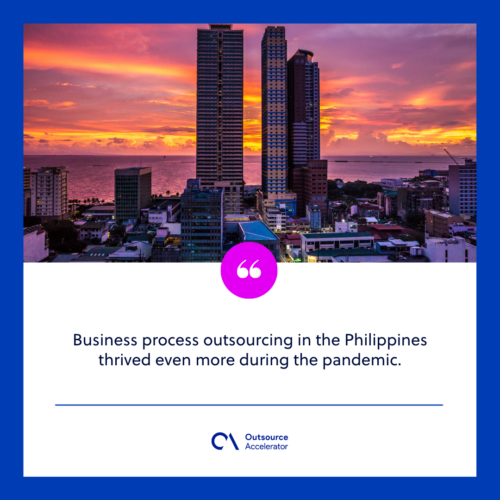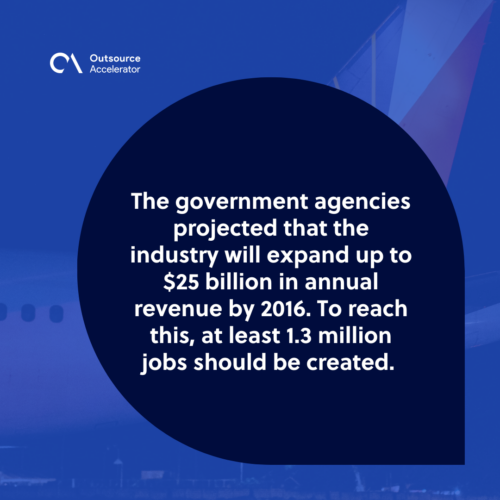Pandemic or not: Ongoing success of the BPO industry in the Philippines

The COVID pandemic might have affected the way businesses work today, but it won’t bring the outsourcing industry down.
The pandemic brought changes to the ways of work and living for people around the world. It has especially highlighted the need for digitization of processes and procedures, forcing remote work for everyone.
In-house work won’t be feasible and affordable to everyone in these times. Thus, highlighting another way to run a business: through outsourcing.
Business process outsourcing in the Philippines thrived even more during the pandemic. This is since businesses tend to cut costs, save on resources, and change strategies in running a business. As an outsourcing leader, the Philippines is one of the most viable options for them.
In this article, let’s learn about the growth of the BPO industry in the Philippines, its strengths, and the current outsourcing climate in the Philippines.

The rapid growth of IT-BPO in the Philippines
History
From the industry’s inception in 1992, several key persons and organizations have contributed to the growth of the industry today. Front runners such as Accenture, eTelecare, and Sykes saw the potential of the country to flourish as an outsourcing country.
Key persons such as former Secretary Mar Roxas and Karen Batungbakal, meanwhile, campaigned for the industry to its first big client countries. This started the spike in delegated services to the country.
IT-BPO roadmap 2011-2016
Years after the global financial crisis, global outsourcing showed its countercyclical nature by surviving through it. Its demand was expected to grow to $270 billion by 2016 with the massive influx of outsourced functions in the market.
The DICT and IBPAP saw this opportunity and formulated a five-year plan to improve the country’s ranking and market size.
Thus, they launched the IT-BPO Road Map 2011-2016 to highlight the Philippine BPO industry’s strengths, projections, and goals for the following years.
The government agencies projected that the industry will expand up to $25 billion in annual revenue by 2016. To reach this, at least 1.3 million jobs should be created.
The road map identified a few key points to improve in this five-year plan, including:
- Setting the Next Wave Cities as alternative outsourcing locations
- Improving educational and training infrastructures
- Strengthening private-public partnership initiative
- Design educational curriculum aligned to strengthen the IT-BPO industry
Updated roadmap 2017-2022
Fast forward to 2016, global outsourcing evolved into a multi-billion dollar market that provides multiple services from clients around the world. The country, meanwhile, remains to be one of the leading outsourcing destinations.
The IT-BPO Roadmap 2016-2022 first reported the following projections and goals:
- Studies project IT outsourcing services to remain prevalent for all sectors for the next few years. Subsegments such as oil and gas, education, and government, meanwhile, would see the increasing need for knowledge process outsourcing (KPO) services.
- The Philippines is one of the expected countries to deliver these services. With this, IBPAP projects a growth rate of 9.2% for the industry or around $38.9 billion for the next six years. Projected employment, meanwhile, will increase to 1.8 million by 2022.
- Key high-impact programs (HIPs) were also highlighted to support the growth of the industry. They were identified into several themes including human capital, inclusive growth, government support, country competitiveness, and impact of technology.
However, the industry experienced setbacks in revenues in the following years. The few declines which started in 2018 caused IBPAP to recalibrate its road map a few times until 2019.

The BPO industry in the Philippines as of today
The next years after the recalibration curbed the outsourcing industry to its current condition. In 2019, a World Trade Report indicated that the industry accounted for a 7.3% contribution to the Philippine GDP.
The following year, it recorded a 1.4% revenue growth in the midst of the pandemic.
Currently, the trend continues to grow, with the expectations in 2022 retained according to the latest roadmap. Being a Knowledge Process Outsourcing (KPO) leader, KPO services in the Philippines continue to flourish especially in the healthcare, gaming, and animation verticals.
To further support industry growth, meanwhile, IBPAP launched the Digital Cities 25. This identifies 25 locations outside the leading cities that will serve as alternate outsourcing destinations in the country.
Strengths of BPOs in the Philippines
The Philippines is seen as an ideal investment location for foreign companies. However, the outsourcing industry won’t be as high-demand as today if not for its following strengths.
Costs
Compared to other countries, companies can hire an outsourced worker from the Philippines at a fraction of the cost of their local counterparts. For instance, an average worker in the country earns at least $500/month depending on their role.
Costs in the Philippines are kept low due to its affordable resources and costs of living. Aside from these, investors in the country also receive incentives such as tax holidays and eased documentary processes.
People
There’s an abundance of Filipino workforce available and willing to enter the industry. With this, companies won’t have to experience redundancy and worker shortage in terms of their outsourced functions.
Among other sectors, the BPO industry provides the best security for these workers, with competitive salaries and benefits provided by outsourcing partners.
Not to mention, Filipinos are the warmest, most professional employees a business can have. As a part of their values, they know how to empathize and take care of their customers throughout the entire interaction.
Culture
The Philippines has a close cultural affinity with the United States. Its education system aligns with the US and incorporates learning English as one of its native languages. What’s more, Filipinos are inclined to foreign media, including TV shows, books, and movies.
With this, foreign clients are more comfortable in working and interacting with Filipino teams. They can easily integrate their processes, metrics, and work culture to their outsourced workforce with little to no hurdles experienced.
Sectors
According to the DICT Primer, over 20 functions are offered by BPO companies in the Philippines as of 2011.
The country is one of the biggest providers of call center services and second-largest, meanwhile, for non-voice services. In 2017, IBPAP saw a trend in the rising KPO services, especially in the development and design sectors.







 Independent
Independent




